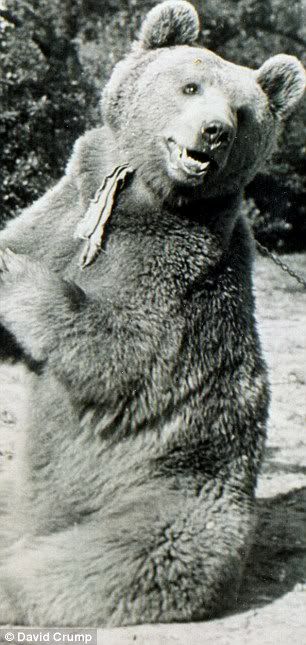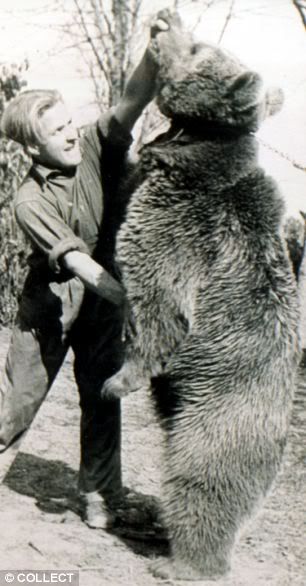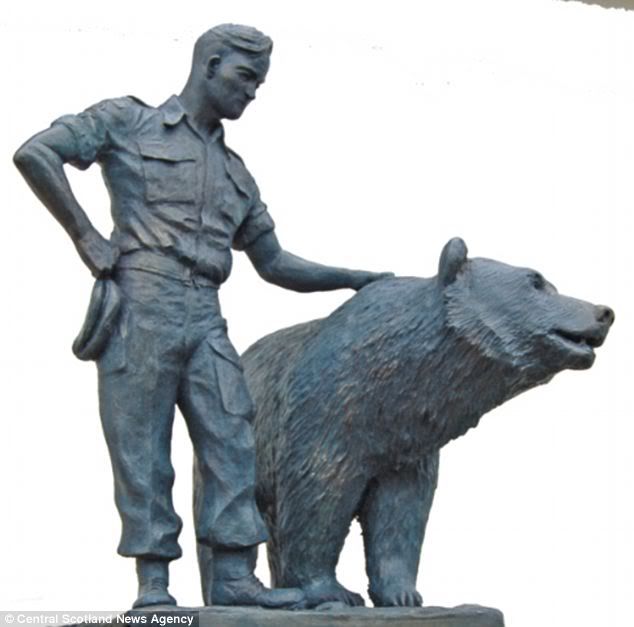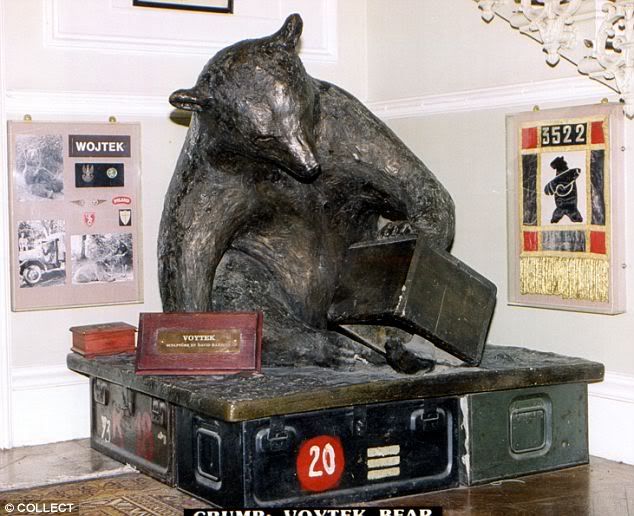'Private Wojtek' was a 6ft-tall 35 stone Syrian brown bear which was adopted by a Polish regiment stationed in the Middle East .
When Allied commanders issued an order that troops advancing on Rome were not to be accompanied by animals, the bear was promptly enlisted in the 22nd Transport Division (Artillery Supply) of the Polish 2nd Army Corps.
Wojtek, which means - 'he who enjoys war' or 'smiling warrior' - became a popular figure, enjoying treats of beers and cigarettes given to him by soldiers.



During his most famous escapade, the animal voluntarily carried shells for Allied guns during the brutal Battle of Monte Cassino in 1944.
After the war the bear moved with his unit to Berwickshire, Scotland. In 1947 he was moved to Edinburgh Zoo where he spent the rest of his life.
Now the Scottish capital will commemorate his extraordinary life with the statue by sculptor Alan Herriot.
It will show the bear and his ‘keeper’, soldier Peter Prendys, placing a hand on the shoulder of the gentle giant, a stance he always adopted when the pair walked around camp together.
Mr Herriot said: 'Wojtek may be most famous for assisting his fellow soldiers in carrying the shells, but really the value was in the effect his presence had on morale.
'I was very keen to depict that close friendship they enjoyed with him, as well as the entertainment and laughter he brought to the troops.
'We are also talking to people about raising a similar statue in Warsaw and Monte Cassino.
'It’s not just about the bear, it is also to commemorate the part the Polish played in the Second world War.
'The British and other European countries owe a great deal to them.'
Wojtek - a Polish boys name which means 'happy warrior' - was acquired by the Polish Army as a cub, and quickly took on the role of mascot.
He provided a 'welcome distraction' from the horrors of the desert war, wrestling with the troops and entertaining them by getting into countless scrapes, from getting stuck up a palm tree to cornering an Arab spy.
He also became fond of drinking beer and smoking and eating cigarettes, making him a perfect friend for the soldiers.
When the war finished, Wojtek and his company were relocated to Winfield camp near Hutton in Berwickshire before the bear was moved to Edinburgh Zoo in 1947, where he lived out his final years.
Several sites in the capital are considered for the monument, including Hillside Crescent and Calton Hill.
When this is decided, an application for permission will be submitted to Edinburgh City Council, with the intention that the statue will be unveiled in around 12 months’ time.
The campaign to put up the memorial is backed by Cardinal Keith O’Brien - most of the Polish soldiers were Catholic - together with Euan Loudon, the former governor of Edinburgh Castle and Aileen Orr, author of the book Wojtek the Bear: Polish War Hero.
She said she had been captivated by his story ever since she visited him at Edinburgh Zoo, aged eight, with a Polish friend.
When Wojtek heard her friend speaking Polish his ears pricked up and he waved to the two delighted school girls.
In addition, Ms Orr’s grandfather, who had met the bear on a number of occasions during the war, told her stories about him when she was a child.
Ms Orr, from Lockerbie, said: 'Like many men, my grandfather didn’t like to talk about the war.
'But he was able to talk about about it a bit by telling me about Wojtek. He met the bear while he was serving in Palestine and Egypt and it made a great impression on him.
'What the bear offered all of these men was comfort. At a time when they were far from home, had nothing, and often no-one, Wojtek stood in for the wives, children, pets, family they’d left behind.
'He was someone to love and someone who loved them back.'
Edinburgh’s Lord Provost George Grubb said: 'Wojtek, the Soldier Bear, was a very familiar and much-cherished figure in Edinburgh and became part of the tradition and history of the Polish community in the city.
'We would like to ensure that his memory is preserved for generations to come and our monuments experts are currently working with the Polish community to help identify a suitably prominent site for his memorial statue.'






0 comments:
Post a Comment